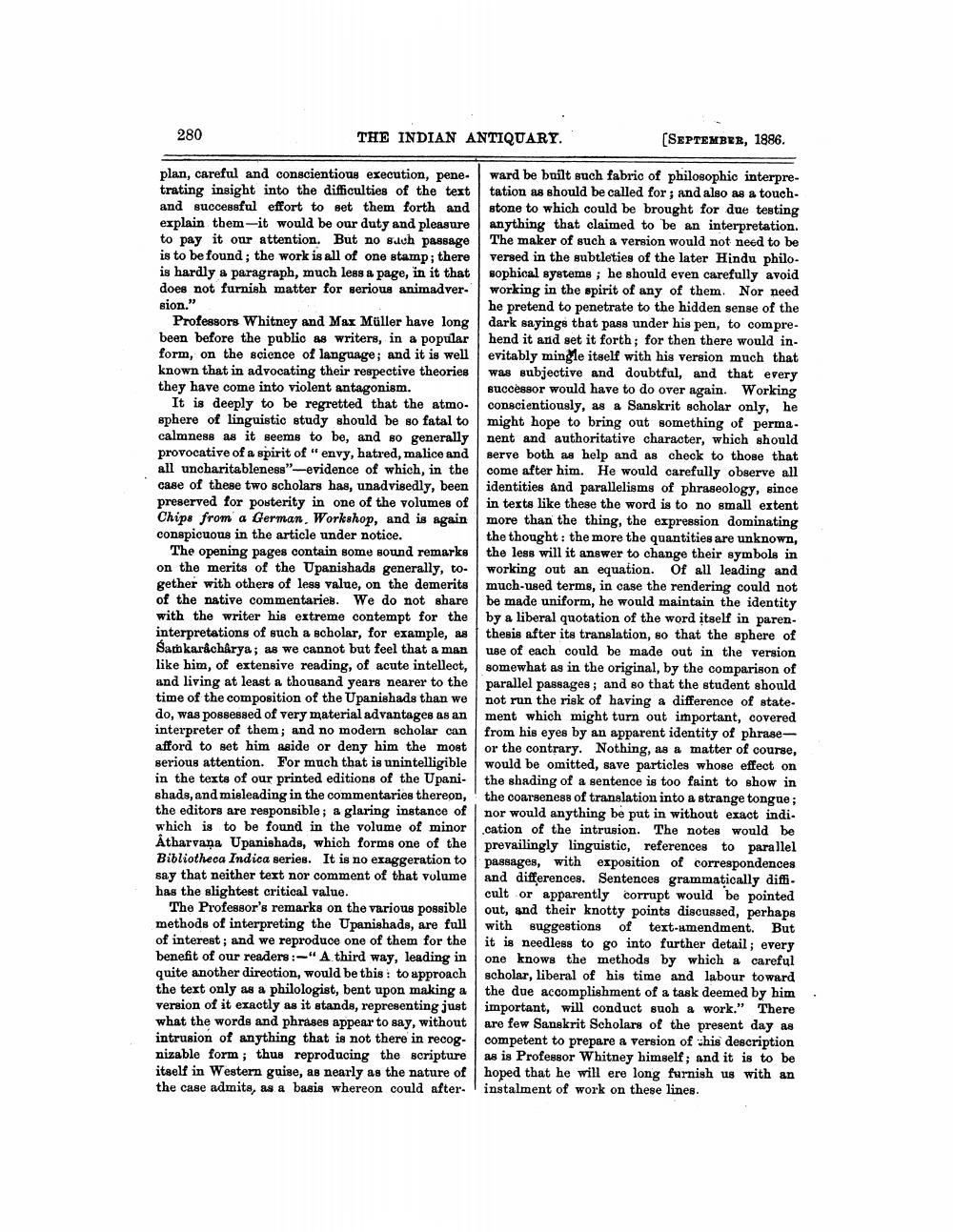________________
280
THE INDIAN ANTIQUARY.
(SEPTEMBER, 1886.
plan, careful and conscientious execution, penew ard be built auch fabric of philosophic interpretrating insight into the difficulties of the text tation as should be called for, and also as a touchand successful effort to set them forth and stone to which could be brought for due testing explain them-it would be our duty and pleasure anything that claimed to be an interpretation. to pay it our attention. But no such passage The maker of such a version would not need to be is to be found; the work is all of one stamp; there versed in the subtleties of the later Hindu philois hardly a paragraph, much less a page, in it that sophical systems; he should even carefully avoid does not furnish matter for serious animadver- working in the spirit of any of them. Nor need sion."
he pretend to penetrate to the hidden sense of the Professors Whitney and Max Müller have long dark sayings that pass under his pen, to comprebeen before the public as writers, in a popular hend it and set it forth; for then there would inform, on the science of language; and it is well evitably mingle itself with his version much that known that in advocating their respective theories was subjective and doubtful, and that every they have come into violent antagonism.
Buccessor would have to do over again. Working It is deeply to be regretted that the atmo- conscientiously, as a Sanskrit scholar only, he sphere of linguistic study should be so fatal to might hope to bring out something of perma. calmness as it seems to be, and so generally nent and authoritative character, which should provocative of a spirit of "envy, hatred, malice and serve both as help and as check to those that all uncharitableness"-evidence of which, in the come after him. He would carefully observe all case of these two scholars has, unadvisedly, been identities and parallelisms of phraseology, since preserved for posterity in one of the volumes of in texts like these the word is to no small extent Chips from a German, Workshop, and is again more than the thing, the expression dominating conspicuous in the article under notice.
the thought : the more the quantities are unknown, The opening pages contain some sound remarks the less will it answer to change their symbols in on the merits of the Upanishada generally, to working out an equation. Of all leading and gether with others of less value, on the demerits much-used terms, in case the rendering could not of the native commentaries. We do not sharebe made uniform, he would maintain the identity with the writer his extreme contempt for the by a liberal quotation of the word itself in pareninterpretations of such a scholar, for example, as thesis after its translation, so that the sphere of Sankaracharya ; as we cannot but feel that a man use of each could be made out in the version like him, of extensive reading, of acute intellect, somewhat as in the original, by the comparison of and living at least a thousand years nearer to the parallel passages, and so that the student should time of the composition of the Upanishads than we not run the risk of having a difference of statedo, was possessed of very material advantages as an ment which might turn out important, covered interpreter of them; and no modern scholar can from his eyes by an apparent identity of phraseafford to set him aside or deny him the most or the contrary. Nothing, as a matter of course, serious attention. For much that is unintelligible would be omitted, save particles whose effect on in the texts of our printed editions of the Upani- the shading of a sentence is too faint to show in shads, and misleading in the commentaries thereon, the coarseness of translation into a strange tongue; the editors are responsible; a glaring instance of nor would anything be put in without exact indi. which is to be found in the volume of minor .cation of the intrusion. The notes would be Atharvana Upanishads, which forms one of the prevailingly linguistic, references to parallel Bibliotheca Indica series. It is no exaggeration to passages, with exposition of correspondences say that neither text nor comment of that volume and differences. Sentences grammatically diffihas the slightest critical value.
cult or apparently corrupt would be pointed The Professor's remarks on the various possible out, and their knotty points discussed, perhaps methods of interpreting the Upanishads, are full with suggestions of text-amendment. But of interest; and we reproduce one of them for the it is needless to go into further detail; every benefit of our readers :-"A third way, leading in one knows the methods by which a careful quite another direction, would be this to approach scholar, liberal of his time and labour toward the text only as a philologist, bent upon making a the due accomplishment of a task deemed by him version of it exactly as it stands, representing just important, will conduct such a work." There what the words and phrases appear to say, without are few Sanskrit Scholars of the present day as intrusion of anything that is not there in recog- competent to prepare a version of his description nizable form; thus reproducing the scripture as is Professor Whitney himself; and it is to be itself in Western guise, as nearly as the nature of hoped that he will ere long furnish us with an the case admite, as a basis whereon could after instalment of work on these lines.




